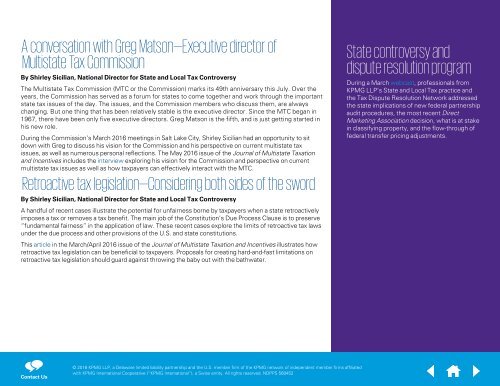Tax Dispute Resolution Quarterly
29rgRWs
29rgRWs
You also want an ePaper? Increase the reach of your titles
YUMPU automatically turns print PDFs into web optimized ePapers that Google loves.
A conversation with Greg Matson—Executive director of<br />
Multistate <strong>Tax</strong> Commission<br />
By Shirley Sicilian, National Director for State and Local <strong>Tax</strong> Controversy<br />
The Multistate <strong>Tax</strong> Commission (MTC or the Commission) marks its 49th anniversary this July. Over the<br />
years, the Commission has served as a forum for states to come together and work through the important<br />
state tax issues of the day. The issues, and the Commission members who discuss them, are always<br />
changing. But one thing that has been relatively stable is the executive director. Since the MTC began in<br />
1967, there have been only five executive directors. Greg Matson is the fifth, and is just getting started in<br />
his new role.<br />
During the Commission’s March 2016 meetings in Salt Lake City, Shirley Sicilian had an opportunity to sit<br />
down with Greg to discuss his vision for the Commission and his perspective on current multistate tax<br />
issues, as well as numerous personal reflections. The May 2016 issue of the Journal of Multistate <strong>Tax</strong>ation<br />
and Incentives includes the interview exploring his vision for the Commission and perspective on current<br />
multistate tax issues as well as how taxpayers can effectively interact with the MTC.<br />
Retroactive tax legislation—Considering both sides of the sword<br />
By Shirley Sicilian, National Director for State and Local <strong>Tax</strong> Controversy<br />
A handful of recent cases illustrate the potential for unfairness borne by taxpayers when a state retroactively<br />
imposes a tax or removes a tax benefit. The main job of the Constitution’s Due Process Clause is to preserve<br />
“fundamental fairness” in the application of law. These recent cases explore the limits of retroactive tax laws<br />
under the due process and other provisions of the U.S. and state constitutions.<br />
This article in the March/April 2016 issue of the Journal of Multistate <strong>Tax</strong>ation and Incentives illustrates how<br />
retroactive tax legislation can be beneficial to taxpayers. Proposals for creating hard-and-fast limitations on<br />
retroactive tax legislation should guard against throwing the baby out with the bathwater.<br />
State controversy and<br />
dispute resolution program<br />
During a March webcast, professionals from<br />
KPMG LLP’s State and Local <strong>Tax</strong> practice and<br />
the <strong>Tax</strong> <strong>Dispute</strong> <strong>Resolution</strong> Network addressed<br />
the state implications of new federal partnership<br />
audit procedures, the most recent Direct<br />
Marketing Association decision, what is at stake<br />
in classifying property, and the flow-through of<br />
federal transfer pricing adjustments.<br />
© 2016 KPMG LLP, a Delaware limited liability partnership and the U.S. member firm of the KPMG network of independent member firms affiliated<br />
with KPMG International Cooperative (“KPMG International”), a Swiss entity. All rights reserved. NDPPS 568452


